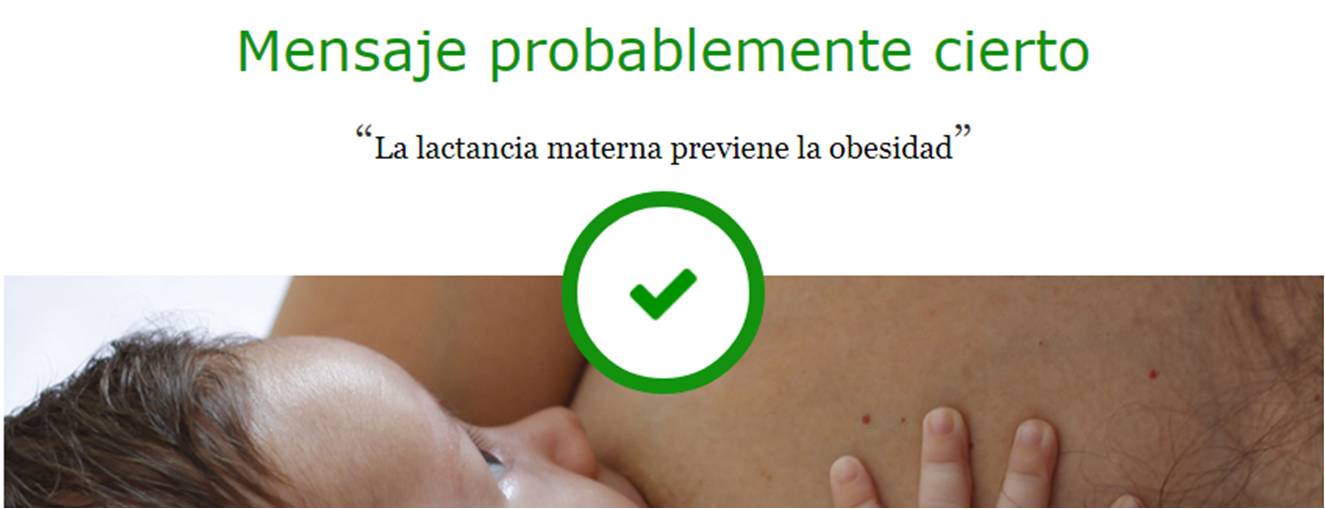Breastfeeding may reduce the risk of obesity
Although the available studies do not allow confirming this benefit, the latest Nutrimedia report drafted by the Science Communication Observatory directed by Gonzalo Casino, professor in the Department of communication, makes such an assertion..

In recent decades, numerous studies have supported the benefits for babies of breast over formula milk. Breastfeeding is associated with multiple benefits for the baby, such as providing it with its first defences against infection, the lower risk of food allergies and a long list of diseases, in addition to fostering an emotional bond with the mother.
A new Nutrimedia assessment analyses the degree of certainty of the evidence linking breastfeeding with lower development of overweight and obesity
One of the benefits attributed to breastfeeding is the possible reduction of the risk of developing overweight and obesity, a public health problem which, according to the World Health Organization (WHO), affects 1,900 million people all over the world. The public interest in knowing whether or not breastfeeding prevents the development of obesity has been reflected in the survey conducted by Nutrimedia, a project of the Scientific Communication Observatory (OCC) of the Department of Communication at UPF. To answer this question, Nutrimedia has reviewed the available scientific evidence, reaching the conclusion that breastfeeding might reduce excess weight, although at the moment it is not possible to confirm this benefit.
Breastfeeding has many benefits for the baby and for the mother, but reducing the risk of developing overweight is not proven
The evaluation by Nutrimedia considers the message that “breastfeeding prevents obesity” as “probably true”, but does not classify it as “true”. This is because there are many observational studies that associate breastfeeding with a lower risk of the baby of developing overweight and obesity compared to feeding with breastmilk substitute; in particular, the data from these studies, conducted on more than 60,000 boys and girls, estimate that less than 10 cases of overweight and obesity are recorded for every 1,000 infants. However, the confidence in the results of this type of study is low, so it cannot be confirmed that the lower risk observed among individuals who were breastfed is actually due to this source of nutrition.
The benefit observed could be due to breastfeeding and/or other factors, without being able to clarify the relative importance of each of them. With the available proof it can only be affirmed that breastfeeding “might” reduce the risk of developing overweight and obesity, but it cannot be stated to be 100% sure. The means of demonstrating this beneficial effect would be to perform a clinical trial comparing the risk of developing overweight and obesity in two groups of babies distributed at random (one group fed with baby formula and another with breastmilk). But conducting an experiment of this type would not be ethical since breastfeeding is known to provide various benefits and would be depriving the children included in the control group (non-breastfeeding).
This excess fat increases the risk of non-communicable diseases, such as cardiovascular diseases, diabetes, osteoarthritis and some cancers; obese children are more likely to develop diabetes, high blood pressure, asthma, sleep disorders, low self-esteem and depression, among other health problems
In 2016, 1,900 million adults worldwide were diagnosed as being overweight, of whom more than 650 million were obese. In the same year, 41 million children under five were recorded as being obese or overweight, and 340 million cases between the ages of 5 and 19. These are data from the WHO, which defines overweight and obesity as an abnormal or excessive accumulation of fat that may be harmful to the health. This excess fat increases the risk of non-communicable diseases, such as cardiovascular diseases, diabetes, osteoarthritis and some cancers; obese children are more likely to develop diabetes, high blood pressure, asthma, sleep disorders, low self-esteem and depression, among other health problems.
Following a certain rise in the use of formula milk in the middle of the 20th century, the United Nations Food and Agriculture Organization (FAO) considered breastfeeding as one of the new priorities in its commitment to improve nutrition. Since then, the main national and international health authorities have recommended exclusively breastfeeding during the first six months of life, as does the Spanish Agency for Consumer Affairs, Food Safety and Nutrition (AECOSAN), for example. The Spanish Ministry of Health and Social Policy also highlights the likely contribution of breastfeeding to reducing overweight and obesity in the Clinical practice guideline on the prevention and treatment of childhood and juvenile obesity, published in 2009.
Evaluation of breastfeeding: https://www.upf.edu/web/nutrimedia/-/la-lactancia-materna-aparte-de-otros-muchos-beneficios-para-la-salud-podria-tambien-ayudar-a-prevenir-el-sobrepeso-y-la-obesidad
Complete technical report: https://tinyurl.com/y7std563
Nutrimedia: www.upf.edu/web/nutrimedia
